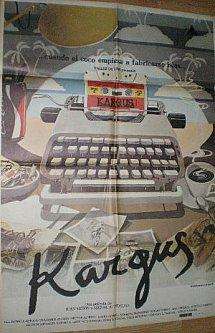Kargus
Kargus is a 1981 Spanish drama film written and directed by Juan Miñón and Miguel Ángel Trujillo, at their feature film debut.[1]
| Kargus | |
|---|---|
 | |
| Directed by | Juan Miñón Miguel Ángel Trujillo |
| Written by | Juan Miñón Miguel Ángel Trujillo |
| Starring | Héctor Alterio Laura Cepeda |
| Music by | Pedro Luis Domingo |
| Cinematography | José Luis Martínez Miguel Ángel Trujillo |
Release date |
|
| Language | Spanish |
The film was entered into the main competition at the 38th edition of the Venice Film Festival.[2]
Plot
A series of Vignettes that begin at the Civil War and end at the Spanish Economic Miracle is interwoven with 2 separate abstractions
- Seeking a Utopia in the Gilbert Islands
- A possible escape from the Social order to El "otro lado"
In Vignete 1 The train which is apparently going to Vizcaya? offers a possible escape route (to France?) In Vignette 2 We see an escape from the Oppressive Social Services that want the change a family (from being hunter gatherers) to fit back into the state sponsored social order. Vignette 3 Focuses on a schoolroom in the 1950s and suggests that one can learn more from daydreaming than following the dry logic of the schoolmaster Vignette 4 at a Rapid Driving School perhaps makes fun of a girl who only looks at the inside of a vehicle and gets a rude awakening when she glimpse the outside of the car Vignete 5 Deals with graffiti removal where the technicians have to think long and loud about the political meanings to choose which graffiti they will remove and which they will allow.
Cast
- Héctor Alterio
- Laura Cepeda
- Francisco Algora
- Luis Ciges
- María Vaner
- Gustavo Pérez de Ayala
- María Luisa Ponte
References
- José F. Beaumont (19 June 1981). ""Kargus", una reflexión sobre los últimos 40 años de la historia de España". El País. Retrieved 2 November 2015.
- Adriano Aprà, Giuseppe Ghigi, Patrizia Pistagnesi. Cinquant'anni di cinema a Venezia. La Biennale di Venezia, 1982. ISBN 8820802988.